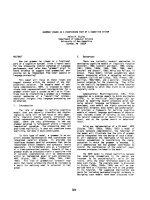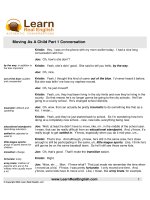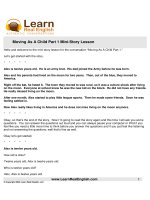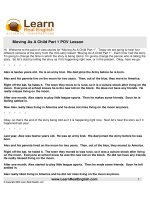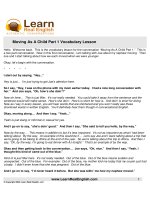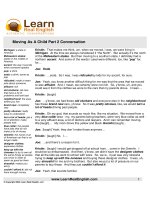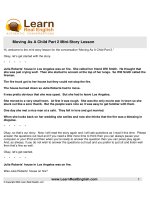moving as a child part 1 vocabulary
Bạn đang xem bản rút gọn của tài liệu. Xem và tải ngay bản đầy đủ của tài liệu tại đây (95.15 KB, 9 trang )
Moving As A Child Part 1 Vocabulary Lesson
www.LearnRealEnglish.com 1
© Copyright 2008: Learn Real English, LLC
Hello. Welcome back. This is the vocabulary lesson for the conversation “Moving As A Child Part 1.” This is
a two part conversation. Now in this first conversation, I am talking with Joe about my nephew moving. Then
Joe and I start talking about how we each moved when we were younger.
Okay, let’s begin with the conversation.
* * * * *
I start out by saying, “Hey ”
Hey is just… I’m just trying to get Joe’s attention here.
So I say, “Hey, I was on the phone with my mom earlier today. I had a nice long conversation with
her.” And Joe says, “Oh, how’s she doin’?”
Now oh here… This is just filler. It’s not really needed. You could take it away from the sentence and the
sentence would still make sense. How’s she doin’. How’s is short for how is. And doin’ is short for doing.
Now as I say in every lesson, you will hear words that are shortened and you won’t really see these
shortened words in written English. You’ll definitely hear them though in conversational English.
Okay, moving along… And then I say, “Yeah ”
Yeah is just slang or informal or casual for yes.
And I go on to say, “she’s doin’ good.” And then I say, “She said to tell you hello, by the way.”
Now by the way… This means in addition to but it’s less important. It’s not as important as what I had been
talking about. By the way. An example of this would be if… Let’s say Joe and I were talking about a trip that
we’re going to be taking to Africa at the end of the year. So we’re talking about this trip to Africa. And then I
say, “Oh, by the way, I’m going to eat dinner with AJ tonight.” That’s an example of by the way.
Okay and then getting back to the conversation… Joe says, “Oh, nice.” And then I say, “Yeah, I
thought this kind of came out of the blue.”
Kind of is just filler here. It’s not really needed. Out of the blue. Out of the blue means sudden and
unexpected. Out of the blue. For example: Out of the blue, my mother told me today that my cousin just had
a baby. I didn’t even know that she was pregnant. Out of the blue.
And I go on to say, “I’d never heard it before. But she was tellin’ me how my nephew moved.”
Moving As A Child Part 1 Vocabulary Lesson
www.LearnRealEnglish.com 2
© Copyright 2008: Learn Real English, LLC
Tellin’. This is short for telling.
And then Joe says, “Oh, he just moved?”
Now just… This is really filler here. You could take it away and this sentence would still make sense.
And I say, “Yeah, um ”
Um is just filler.
And I go on to say, “they had been living in the city limits…”
Or I am saying they had been living inside the city.
And then I say, “and now they’re living in the county.”
Now a county… This is a large area that has a city or cities within it. For example: You have a city or cities
and then you have a county that has the city or cities within it. And then a state has counties in it, within it.
And I go on to say, “So that means he’s no longer gonna be going to the city schools.”
Now gonna… This is just slang for going to.
And I go on to say, “He’ll be going to a county school. He’s changed school districts.”
Or he’s changed schools. So basically what I’m saying here is my nephew has been living in a city called
Gainesville. It’s in the state of Georgia. And he and his family have moved out from out of the city, moved
into the county. So he’s changing schools. He won’t be going to a Gainesville city school anymore. He’ll be
going to a school that’s in the county, in the area that’s outside of the city.
And then Joe says, “Oh, wow ”
Now here he’s just showing emotion such as, wow, I feel sorry for him.
And Joe goes on to say, “that can actually be pretty traumatic…”
Now actually is just filler here. It’s not really needed. And pretty here is very, very traumatic. Traumatic.
This means something that is difficult and upsetting. Traumatic. For example: When Kim was a child, she
was in the car when her mother crashed the car. It was a traumatic experience. Traumatic.
Moving As A Child Part 1 Vocabulary Lesson
www.LearnRealEnglish.com 3
© Copyright 2008: Learn Real English, LLC
Okay so getting back to the conversation… Joe is saying, “can actually be pretty traumatic to do
something like that as a kid.”
To do something such as that as a kid, or child.
And Joe says, “I mean ”
So Joe is starting to say, what I’m trying to say
And then I say, “Yeah, and they’ve just started back to school.”
So I’m saying, they’ve just started the new school year.
And then I say, “So I’m wondering…”
Or I’m saying, I’ve been thinking about him.
And I go on to say, “how he’s doing at a completely new school new, new kids, everything being
new.” And Joe says, “Well ”
Well is just filler here. It’s not really needed.
Joe says, “at least…”
Or he’s saying, it’s good.
“he didn’t have to move, like, mi-, in the middle of the school year. I mean, that can be really
difficult…”
Or that can be very difficult.
“from an educational standpoint.”
Now educational standpoint… This is describing education. For example: When I was a child and my family
moved, we moved to an area that had much better schools. So I would say that moving was good from an
educational standpoint. Educational standpoint.
And Joe goes on to say, “And, y’know ”
Y’know is short for you know.
Moving As A Child Part 1 Vocabulary Lesson
www.LearnRealEnglish.com 4
© Copyright 2008: Learn Real English, LLC
And Joe says, “it’s really tough…”
Or he’s saying, it’s very difficult.
“to get settled in.”
Settled in. This means adjusted or used to. Settled in. For example: I can remember the flight to Thailand
being twenty hours long. It was so long. Because it was so long it took me a day to get settled in. Settled in.
And then Joe goes on to say, “Y’know, especially…”
Or he’s saying most importantly.
“when you do it mid-year, um ”
Now mid-year… This means in the middle of the year.
And then I say, “That’s true. And although ”
Or I’m saying even though.
“y’know, he’s still in the same area, he’s close enough to still be participating in…”
Or he’s close enough to be still playing in.
“the same, uh, little league sports.”
Now uh is just filler. It’s not really needed. Little league sports. This is a group of sports teams for children.
Little league sports. An example of little league sports would be: Joe played little league sports when he was
a child. He loved to play baseball. Little league sports.
And then I go on to say, “Like ”
And like is just filler here.
“Like, I think he’s still gonna be on the same baseball team. So he’ll still see those same kids.”
Or he’ll still be around those same kinds.
Moving As A Child Part 1 Vocabulary Lesson
www.LearnRealEnglish.com 5
© Copyright 2008: Learn Real English, LLC
And Joe says, “Oh, that’s good. That’ll make the transition easier.”
Transition. This is change. Transition. For example: When Joe moved at the age of twelve it was a difficult
transition. He missed his friends in New York. Transition.
And then I say, “Right.”
So I’m just saying, yes. I’m agreeing with Joe.
And then Joe says, “Wow, eh-… Man.”
Now, he’s just showing emotion here.
And Joe goes on to say, “Y’know what? That just made me remember the time when I moved as a
kid. Y’know, I was pretty fortunate.”
Fortunate. This means lucky. Fortunate. An example of fortunate is: Harry is very fortunate. One day he
was walking home from work and he found $100. Fortunate.
And then Joe goes on to say, “I only moved one time. And, y’know, some kids have to move a lot.
Like, I mean, like army brats, for example.”
Army brats. These are children of parents who are in the military who usually move a lot. Now military…
The military is the Army, or the Navy, or the Air Force, or the Marines. That’s what military is or means. An
example of army brats would be: When I was younger I knew a girl named Katie. She was an army brat.
Her family moved five times in six years. Army brat, or in this example army brats. And continuing with the
conversation.
I then say, “Yeah.”
Just agreeing with Joe.
And then Joe says, “I mean, I’ve had some friends whose parents were in the Army and they moved a
lot. But, y’know, I, I guess it’s easier when you’re younger. But there comes a point where ”
Now comes a point This means comes a time. There comes a time. For example: There comes a point
when most Americans leave their parents’ home or homes, to go to college, to start working or to start a
family. Comes a point.
And Joe goes on to say, “y’know, it gets really difficult. Like when you’re a teenager. Like ”
Moving As A Child Part 1 Vocabulary Lesson
www.LearnRealEnglish.com 6
© Copyright 2008: Learn Real English, LLC
Now teenager… This is a person between thirteen and nineteen years old. Teenager. An example of
teenager would be: In America teenagers are not allowed to drink alcohol. You have to be twenty-one years
old. Teenager.
And then I say, “Oh, yeah, I, I’ve ” And Joe says, “When I moved I was just about a teenager, so I
know.”
So Joe is saying I was just about a teenager. I was almost a teenager.
And then I say, “Well, I, I’ve only moved once, too ”
Or I’m saying I’ve only moved once also.
And I go on to say, “when I was a child and I was eight.”
So I’m saying I was eight years old.
And I go on to say, “And that was pretty tough for me.” And Joe says, “Yeah, well you can’t
imagine…”
Or he’s saying you can’t even think.
“how difficult it must have been for me. I mean, I moved from New York where I had lived my entire
life.”
Or he’s saying I had lived my whole life.
And then he says, “My whole family was there.”
Now what he’s talking about is his grandparents, his aunts, his uncles, his cousins. So that would be his
extended family. His immediate family would be his mother, his father, his brothers, his sisters. So he’s
saying his whole family was there… his whole extended family, his grandparents, his aunts, his uncles, his
cousins.
And then Joe goes on to say, “Uh, y’know, I’d, I had never moved before so all my friends lived there.
And then I moved to Pennsylvania ”
Now Pennsylvania… This is a northeastern state in America. Pennsylvania.
Moving As A Child Part 1 Vocabulary Lesson
www.LearnRealEnglish.com 7
© Copyright 2008: Learn Real English, LLC
And Joe goes on to say, “rural Pennsylvania.”
Rural. This is an area where there is farmland. Rural. An example of rural would be: Joe moved from New
York to a rural part of the country. He had never lived near a farm before that time. Rural. It’s the opposite
of city.
And then Joe goes on to say, “I mean, it was a complete ”
Or he’s starting to say here, it was a total
And I say, “Oh gosh.”
I’m just showing emotion, like I don’t believe it.
And then Joe finishes by saying, “culture shock.”
It was a complete or total culture shock. Culture shock. This is a feeling, or this is when you feel
uncomfortable when you move to another place and the people are different than the place you lived before.
So feeling uncomfortable when you move to another place and the people are different than the place you
lived before. That’s culture shock. For example: I can remember when I moved to Korea. It was a culture
shock. I had never been to an Asian country before. It was very different from America. Culture shock.
And then I say, “Yeah, I bet.”
I bet means I agree. I bet.
And then Joe says, “And ”
And And here is just filler. It’s not really needed.
Joe goes on to say, “y’know, what’s worse is, uh, not only did it seem different to me, I seemed
totally…”
Or he’s saying, I seemed completely or very
“different to all the kids there ” And then I just laugh. And Joe says, “because, I mean first off…”
Or he’s saying, first.
And he goes on to say, “I had this really thick…”
Moving As A Child Part 1 Vocabulary Lesson
www.LearnRealEnglish.com 8
© Copyright 2008: Learn Real English, LLC
Or he’s saying, I had this very strong
“New York accent ”
Now accent… This is the way it sounds when someone speaks. Accent. For example: The people in the
southern part of America have a strong accent. Accent.
And then I just laugh. And Joe says, “so right off the bat ”
Or he’s saying right away, immediately, right off the bat. For example, an example of right off the bat: I found
a job right off the bat when I moved to San Francisco. Right off the bat.
And Joe goes on to say, “y’know, they knew right away that I was not from there.” And then I laugh
again and I say, “Right.”
Just agreeing with him.
And Joe says, “Y’know, it was obvious…”
Or he’s saying, everyone knew.
“I was the new kid on the block.”
New kid on the block. This means new to an area or new person to an area. New kid on the block. For
example: When I first moved to San Francisco I really felt like the new kid on the block. I did not even know
where a grocery store was located. New kid on the block.
And then I say, “Uh-huh.”
Just agreeing with Joe.
And then Joe says, “And I looked different also because the style in New York was much different…”
Or he’s saying, was very different.
“than it was in Pennsylvania.”
Now style, style is fashion. Style. For example: I really liked the way the women in India were dressed when
I was there. They have a much different style than the women in America. Style.
Moving As A Child Part 1 Vocabulary Lesson
www.LearnRealEnglish.com 9
© Copyright 2008: Learn Real English, LLC
* * * * *
Okay, this is the end of the vocabulary lesson for the conversation “Moving As A Child Part 1.” If you feel that
you need to, go back and listen as many times as you need to, to make sure that you understand or have a
basic understanding of the vocabulary. And then when you’re ready, move on to Joe’s mini-story.
Alright, see you for “Moving as a Child Part 2.” Bye bye.


